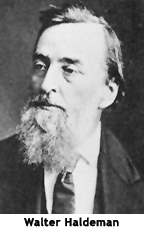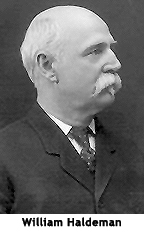|
Civil War slowed things, but Haldemans
made Louisville newspapers prominent
By BRYAN BUSH
Bugle Staff Writer
Walter Haldeman and his son, William, were leading figures in the Kentucky newspaper industry, and, through their efforts, The Courier-Journal and The Louisville Times were established and later became national journalism icons.
 Walter was born in Maysville on April 27, 1821, and started his journalism career in 1840 as a clerk in the business office of The Louisville Daily Journal, one of the leading Whig newspapers in the West. He left after three years to open a bookstore, but later took over The Daily Dime, which became so successful that Haldeman changed the name to The Louisville Morning Courier. Walter was born in Maysville on April 27, 1821, and started his journalism career in 1840 as a clerk in the business office of The Louisville Daily Journal, one of the leading Whig newspapers in the West. He left after three years to open a bookstore, but later took over The Daily Dime, which became so successful that Haldeman changed the name to The Louisville Morning Courier.
On Oct. 30, 1844, he married Elizabeth Metcalf and on July 27, 1846, Elizabeth Metcalf gave birth to William Birch Haldeman. William attended Louisville’s public and private schools and later attended Forest Academy.
As editor of The Louisville Morning Courier, Walter Haldeman changed his Whig affiliation radically from nativist to abolitionist, and eventually to Southern Democrat, and became a radical pro-slavery advocate.
When the Civil War broke out, the Courier expressed strong sympathy for the Confederacy. Union authorities seized Haldeman’s newspaper and issued a warrant for his arrest. Walter left Kentucky for Tennessee and established the Courier in Nashville. However, publication ceased when Nashville fell to Union troops in February 1862. Haldeman later fled to Madison, Ga., where he and his family sat out the war.
 When the Civil War began, son William left school and, without parental permission, joined the Confederacy at age 15. In 1862, he served with Confederate Gen. John Hunt Morgan in Tennessee, and, in October 1862, during the Confederate invasion of Kentucky, William was entrusted with important dispatches sent by Gen. John C. Breckinridge to Gen. Braxton Bragg, commander of the Army of Tennessee. After the Battle of Perryville (Oct. 8, 1862), the Confederates left Kentucky and William followed and rejoined Breckinridge’s command in Knoxville. When the Civil War began, son William left school and, without parental permission, joined the Confederacy at age 15. In 1862, he served with Confederate Gen. John Hunt Morgan in Tennessee, and, in October 1862, during the Confederate invasion of Kentucky, William was entrusted with important dispatches sent by Gen. John C. Breckinridge to Gen. Braxton Bragg, commander of the Army of Tennessee. After the Battle of Perryville (Oct. 8, 1862), the Confederates left Kentucky and William followed and rejoined Breckinridge’s command in Knoxville.
In the winter of 1862-63, William enlisted with Company G, 9th Kentucky Infantry, but in 1864, he was appointed midshipman in the Confederate States Navy and assigned duty on the C.S.S. Patrick Henry. Prior to the engagement between the commands of Confederate Gen. P.G.T. Beauregard and Union Gen. Benjamin Butler, the crew of the Patrick Henry was taken to Fort Stedman. During the battle, William had command of one of the guns. Confederate forces repulsed Butler’s attack after the fall of Petersburg in August 1864.
William resigned from his position in the navy and rejoined his command in the 9th Kentucky Infantry at Aiken, S.C. He remained with the regiment until the surrender at Washington, Ga., in May 1865.
When the war ended, Walter Haldeman returned to Louisville to a hero’s welcome. With the help of his friends, he re-established the Courier. In 1868, he bought The Louisville Journal and The Louisville Democrat and merged the staffs of the Courier and Journal under the Journal’s editor, Henry Watterson. In 1884, Haldeman founded The Louisville Times.
After the war, William returned to Louisville and entered the Kentucky Military Institute and graduated in 1869 with a bachelor of arts degree. He joined his father’s Courier-Journal newspaper, but illness forced him to move to a better climate in Texas. While in Texas, he studied law and was admitted to the bar.
In 1871, William returned to Louisville and became editor of The Courier-Journal and general manager in 1873. In 1885, he was made general manager of both The Courier-Journal and The Louisville Evening Times.
On May 13, 1902, Walter Haldeman was struck by a streetcar while on his way to the office and died three days later. He left an estate valued at more than $1 million. Son William became editor in chief of the Times and his brother, Bruce, took over control of the business management of the newspapers. In April 1906, William was elected Colonel of the First Regiment Infantry, Kentucky National Guard, but resigned in 1909.
In August 1910, Gen. John B. Gordon appointed William commander of the Kentucky Division of the United Confederate Veterans Association with the rank of major general. He died Oct. 27, 1924.
|

